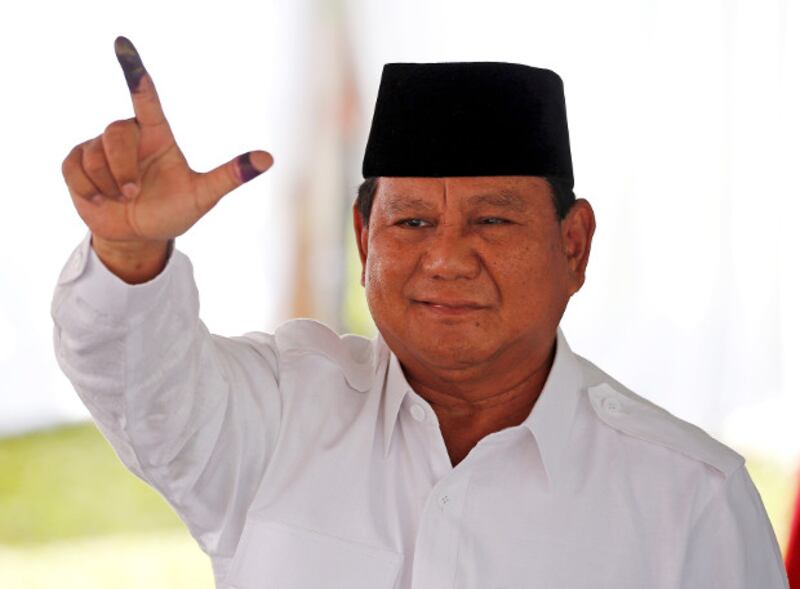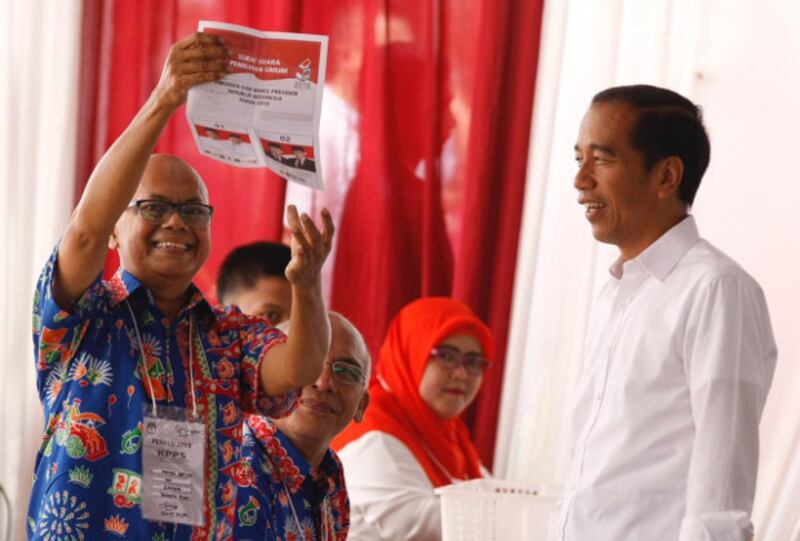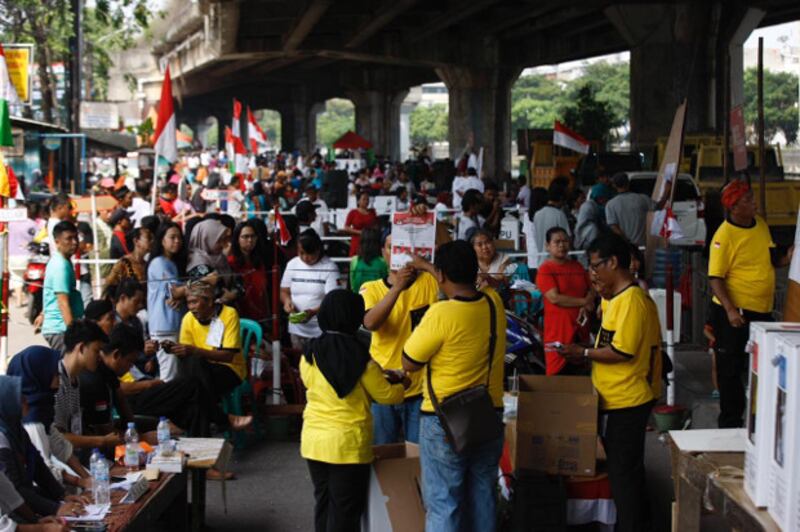Updated at 1:28 p.m. ET on 2019-04-17
Indonesian President Joko “Jokowi” Widodo appeared headed for a second term in office late Wednesday after tens of millions voted across the sprawling archipelago-nation in a democratic exercise billed as the largest direct election ever held.
The 57-year-old former furniture salesman from Central Java took at least 55 percent of votes with more than 97 percent of sample votes counted, according to projections known as “quick counts” by five independent polling organizations.
But his rival, former army Gen. Prabowo Subianto, also declared victory Wednesday night, in a repeat of events that followed the 2014 election. Prabowo eventually conceded a narrow loss to Jokowi after a challenge in the Constitutional Court failed.
Official results are not due until May but quick counts have proven reliable in past elections.
“Based on the results of quick counts by credible pollsters, it appears that I and Ma’ruf Amin are trusted by the Indonesian people to be president and vice president for the period of 2019-2024,” said a statement issued late Wednesday by his campaign, quoting the incumbent.
Jokowi supporters paraded around the Hotel Indonesia roundabout in central Jakarta after the announcement, despite warnings against victory marches issued by government officials on Monday.
Opinion polls before voting day consistently showed Jokowi with a comfortable two-digit lead over Prabowo.
The former general said he had “real numbers” from his own poll monitors showing him with 62 percent of the vote.
“Based on the real count, we are in the position of 62 percent. This is the real count, from 320,000 polling stations, or about 40 percent. I have been told by statisticians that this won't change,” Prabowo said at his house in South Jakarta, in remarks broadcast on TVOne.
“I will be a president for all Indonesians. Those who supported 01, I will still defend you. We will develop an Indonesia that is victorious, an Indonesia that is prosperous, an Indonesia that is peaceful, an Indonesia that is respected by the world, an Indonesia where no one is hungry,” said the 67-year-old former son-in-law of late dictator Suharto, referring to the ballot designation for Jokowi and his running mate, Ma’ruf.
At the end of his remarks Prabowo shouted Allahu Akbar (God is Great) and Merdeka! (Freedom) three times. Then he knelt and kissed the ground, although similar gestures in 2014 were ridiculed by Indonesians on Twitter afterwards.

Election day
About 80 percent of 190 million eligible Indonesians voted at some 800,000 polling stations across the country, according to the Center for Strategic and International Studies, a Jakarta think tank.
Over a six-hour span voters were electing a president, 575 members of the House of Representatives (DPR), 136 members of the Regional Representative Council (DPD) and nearly 20,000 members of local legislatures in 548 provinces, districts and municipalities.
Jokowi and his wife cast their ballots at midday in Gambir, Central Jakarta. He declined to speculate on the outcome, asking voters to be patient, and said he was going home to play with his grandchildren.
Prabowo, for his part, hinted that his supporters might act out if the election was not fair.
“We hope and we pray today’s election will be fair and peaceful. It will be peaceful if it’s fair,” he said after voting in Bogor, south of Jakarta.
“In a football competition, if the referee is not neutral, the losing team will not be happy ... It has been proven time and again that my supporters are always orderly and peaceful. But we don’t want to be cheated.”

‘Mind-boggling’
As polling stations opened in stages across Indonesia, election workers sang the national anthem, swore an oath, and counted blank ballots in front of election monitors before voting could begin.
Noorhayatin, 61, arrived at a polling station in East Jakarta at 6 a.m. to avoid lines.
“I hope with this election Indonesia can have security and justice … and can choose a president who is trustworthy and able to create a prosperous society,” she told BenarNews.
Hours after polls opened, ballots had not still been delivered to polling stations in Wamena and Jayapura, two cities in easternmost Papua province, local reporters told BenarNews.
Mama Yuliana, a resident of the provincial capital of Jayapura, rushed home disappointed after trying to vote early in the day.
“I didn’t cook this morning, the family has not eaten, I’ve already queued at the polling station, but officials say there are no voting materials. This is the most chaotic election we’ve participated in,” she said.
The Lowy Institute, an independent and nonpartisan think-tank based in Sydney, described the scale of the vote in the neighboring country to the north – Southeast Asia’s largest democracy – as unprecedented.
“It will be [the] world’s biggest direct presidential elections (because the U.S. uses an electoral college) and one of the most complicated single-day elections in global history,” according to a recent article in the Interpreter, a daily publication produced by the institute.
“[T]he scale of Indonesia’s electoral process is mind-boggling, with five separate elections at once, for the president, both houses of parliament, provincial legislatures and district/city councils,” it added, noting that the 2019 parliamentary elections in India, the world’s most populous democracy, were being staged in phases over six weeks in April and May.

Concerns
The run-up to the Indonesian election, however, was not entirely seamless.
Workers delivering election supplies across the far-flung archipelago struggled with bad weather and remote locations.
During a three-day campaigning blackout period that preceded Wednesday’s vote, a member of the Election Supervisory Agency (Bawaslu) announced that his group had received 25 complaints about vote buying in 13 provinces.
Bawaslu, which oversees the General Election Commission, had voiced concerns throughout the campaign about efforts to buy votes.
In March, a legislative candidate in Central Java was arrested on suspicion of vote buying, with investigators saying they had seized 8 billion rupiah ($565,000). The cash was parceled out in envelopes and allegedly intended to be distributed to voters at dawn on Election Day.
In addition, Bawaslu officials on April 11 reported finding 40,000 to 50,000 ballots in Malaysian warehouses, with many pre-marked for Jokowi and for legislative candidates in the National Democratic Party, a member of the ruling coalition. They called for a repeat of voting by mail in the Malaysian capital, where many Indonesian expatriates live.
Keisyah Aprilia, Arie Firdaus, Nurdin Hasan, John Kambang, Victor Mambor, Anton Muhajir and Almira Wang contributed to this report.

